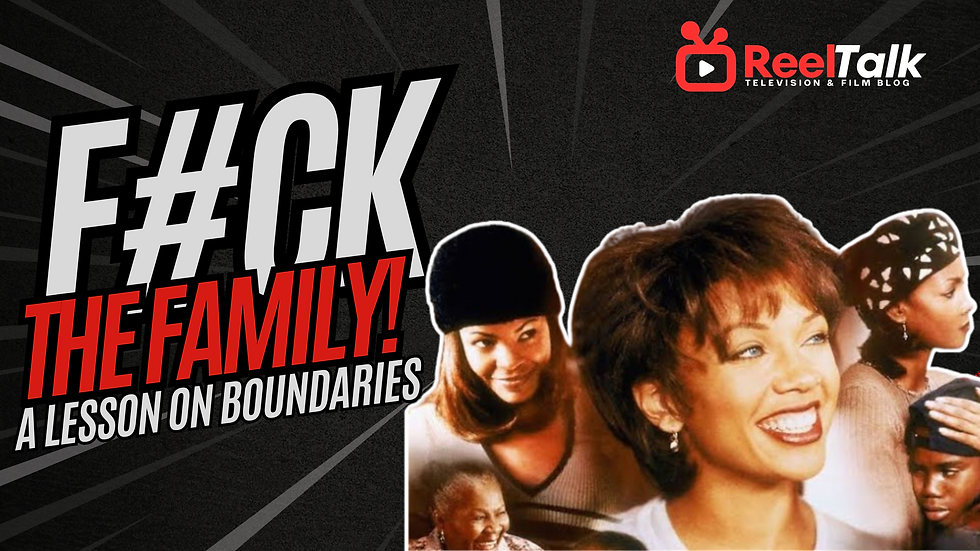F#ck The Family: What Soul Food Taught Me About Boundaries
- ReelTalk Blog

- Jul 23, 2025
- 3 min read

I love my family. I really do. But as I’ve grown older, I’ve realized that love alone isn’t enough to make relationships healthy. Especially when boundaries are ignored, if you scroll through any Black Twitter thread about family dynamics, you’ll see how eerily similar many of our upbringings were. Sure, it’s funny to bond over the shared trauma of being told to “stay in a child’s place” or to “speak when spoken to.” But some of these shared experiences are not just cultural quirks—they’re symptoms of generational dysfunction. One of the most common? The complete disregard for personal boundaries.
Let me be clear: every relationship needs boundaries, including family. If that offends you, ask yourself why. A boundary isn’t an act of rebellion; it’s a form of respect. Merriam-Webster defines a boundary as “a limitation or a point beyond which one cannot go.” It’s the yellow lines on the road. It’s the velvet rope at the club. And emotionally, it’s your right to say, “This is where I end and you begin.” But here’s the problem: many of us never learned how to set boundaries, let alone enforce them. We just learned to endure.
This brings me to Soul Food. I’ve loved this movie for years, but as an adult, it hits differently. Teri, the eldest Joseph sister and a high-powered attorney, is my favorite character, hands down. She’s also the most misunderstood. Teri is the one who “has it together,” which in family dynamics often means: the one who has to fix everything. From paying for Bird’s wedding to covering Big Mama’s house bills and helping Bird start her salon, Teri is the family’s unspoken (and unappreciated) financial backbone. She even calls herself the family ATM—“Automatically Teri’s Money.” That line is funny and tragic because you can hear the exhaustion in her voice.
Teri’s character showed me that constantly being the fixer is a fast track to resentment and emotional isolation. Her giving nature was not respected; it was expected. And once generosity becomes an obligation, it stops being generous. Her family didn’t appreciate her—they felt entitled to her. That’s not love. That’s manipulation.
And if Teri finally says “no,” she’s labeled selfish. That part hits hard. Why is it that the moment you start setting boundaries, people treat you like the villain? If anything, Soul Food makes it clear that saying “no” can be an act of self-preservation, especially when you’re the one who’s always expected to say “yes.”
Watching Teri navigate this dynamic reminded me of a friend who rented from a relative. She paid rent on time, fixed things she didn’t break, and never asked for anything in return. But the moment she withheld rent to recoup a major plumbing repair, her aunt flipped—took her to court and everything. They didn’t speak for nearly twenty years. And why? Because my friend dared to set a boundary after years of being taken advantage of.
Teri was emotionally detached, not because she didn’t care, but because her love was exploited. Her sister Maxine stole her boyfriend. Her cousin Faith slept with her husband. And somehow, Teri was still expected to put the family back together. It’s no wonder she kept her distance. Maxine even told her, “Having money don’t make you better than anybody.” But was that Maxine’s way of dismissing Teri, or revealing her own insecurity?
The truth is, boundaries don’t break families—entitlement does. Teri’s boundaries could’ve saved her relationships if they had been respected. Instead, they were ignored until everything exploded.
So, ask yourself: Are you the Teri in your family? Or, are you the one who keeps taking, assuming someone else will fix it all? Either way, it’s time to reflect.
Boundaries aren’t rejection. Their protection is not just for you, but for everyone involved. Real love doesn’t demand self-sacrifice—it creates space for mutual respect.
And if that means you’ve got to say, “F#ck the family” to protect your peace?
So be it.







Speak it! I was never taught boundaries. You was all in my thoughts but I would not say it. Being emotionally detached is real. I'll stop here I'm in tears
I'll have to watch this as an adult, definitely something to reflect on nonetheless.... GREAT READ!!!!
Ooo chile. I know all too well about the family dynamics - the individual role we all play, or the role we THINK we play in our own families. The older I get, the more "aha" moments I have about it. I think back to my early childhood and realize just how long ago these roles started to evolve. Soul Food was a catalyst for evoking those memories for a lot of people, including me. This was a good analogy 👌🏾